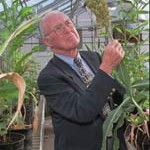Contributed by Erik Ullestad
West Des Moines, IA
Warm-up Question: How would you define greatness?

Dr. Norman Borlaug
Dr. Norman Borlaug, a man who is credited with saving the lives of over 1 billion people and being the “grandfather of the Green Revolution,” died last week at the age of 95. Most of Borlaug’s life was spent finding new ways to increase grain yields in developing countries. His discovery of new type of hybrid wheat strains helped nations avoid widespread famine in the 1950s and 1960s. He was awarded with the Nobel Peace Prize in 1970 for increasing food security in Mexico, Pakistan, and India. Some call Borlaug “the most important man you’ve never heard of.”
Borlaug grew up on a farm in northeast Iowa, the great-grandson of Norwegian immigrants. His grandfather was instrumental in founding a Lutheran church in their community. As he grew, Borlaug developed a love of agriculture and science. He took what he learned in the field and applied it in the labs at the University of Minnesota. From there, he studied how various seeds and fertilizers responded to different climates and geographies.
In addition to the Nobel Peace Prize, Borlaug has also been awarded with the Presidential Medal of Freedom and the Congressional Gold Medal. The only other people to receive all three honors are Mother Teresa of Calcutta, Elie Weisel, Nelson Mandella, and Martin Luther King Jr. In 1986 Borlaug established the World Food Prize which acknowledges people who work to increase the quality and quantity of food in the world.
People close to Dr. Borlaug described him as humble, gracious, and unassuming. In one of his last interviews, Borlaug summed up his efforts by saying, “You can’t build peace and tranquility on empty stomachs and human misery.”
- ELCA News Service, September 25, 2009: “Dignitaries, ELCA Pastor to Memorialize Norman Borlaug, Nobel Prize Winner“
Discussion Questions
- What, if anything, did you know about Norman Borlaug before reading this article?
- How are people in your community working to feed hungry people?
- Think of your definition of greatness. Does this definition apply to people like Dr. Borlaug? Why or why not?
- How important is it for great people to also be famous? What are the benefits? What are the drawbacks?
Scripture Texts (NRSV) for Sunday, September 20, 2009.
(Text links are to oremus Bible Browser. Oremus Bible Browser is not affiliated with or supported by the Evangelical Lutheran Church in America. You can find the calendar of readings for Year B at Lectionary Readings.)
For lectionary humor and insight, check the weekly comic Agnus Day.
Gospel Reflection
Jesus and his friends are taking a long walk (30+ miles) from Mount Hermon to Capernaum. As with any road trip, there were lots of different conversations along the way. One discussion centered on the topic of greatness. The disciples were arguing about who among them was the greatest.
Before we become quick to judge their selfishness, let’s remember the life they had been living for the past few years. Most of these men were from humble origins. They literally dropped everything when Jesus told them to “come and follow me”. This ragamuffin group walked from town to town, not knowing where they would sleep or what they would eat. They had lived as peasants alongside a man who called himself the King of Kings and Son of God. Wouldn’t we be tempted to have a similar conversation about who was the best, the favorite, the most loved, or the greatest disciple?
We learn that Jesus chose not to engage the disciples in the conversation until after they had arrived at Capernaum. Instead of privately addressing his friends, he chose to publicly admonish them for their egocentric chat earlier in the day. Jesus’ decision indicates that he is really angry with his friends and he wants them to be humbled, or perhaps he thinks that there might be others in the room that have had similar discussions with their friends. Siblings that argue about who is the favorite. Servants that claim to be the most dedicated. Carpenters who think they are the best at their craft.
Jesus tells everyone that being great requires becoming a servant; being powerful means becoming childlike. In saying this, Jesus not only reminds his disciples about the foolishness of their argument, but he also is telling people about himself. Jesus’ greatness is not exhibited by military might, shrewd political strategy, or the ability to wave a hand and make things happen. His greatness is manifested in serving others and caring for those in need.
Earlier in Mark 9 we hear Jesus tell his disciples not to tell others about the amazing things that happened on the Mount of Transfiguration. Those words, along with the appointed text from today, give us a clear indication of how Jesus chooses to function. He preferred to teach, heal, and preach quietly and faithfully instead of boasting about his importance. Jesus’ greatness is seen in his service to others and not in making a public spectacle of his mighty acts.
Discussion Questions
- Have you ever argued with your friends, classmates, siblings, etc. about who is the smartest, best-looking, or greatest? Why? What difference did it make?
- Why do you think Jesus doesn’t want to draw a lot of attention to himself?
- What do the images of “servant” and “child” tell us about how Jesus defines greatness?
- Does Dr. Borlaug fit Jesus’ definition of greatness? Why or why not?
- Who is someone you know that seems to exemplify this kind of humble greatness?
Activity Suggestion
(Check with your worship committee or pastor before doing the following activity… or at least give them a heads-up.)
Give each student several colorful index cards or sticky notes. Set out colored pencils or markers for everyone to share. Have people write an affirming statement or scripture verse on each of the papers. (Example: “Jesus loves you” or “Romans 8:38-39”.)
Go to the sanctuary and place these notes into the pages of the hymnals. If a worship service is taking place after your meeting time, stick the note in the page of one of the hymns that will be sung during worship. That way, you know someone will read it!
Closing Prayer
God, help me to serve you by serving others. Give me grace to be humble in my serving. Thank you for sending your son to make the ultimate sacrifice so that we might live eternally with you. Amen.

